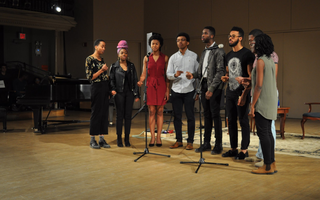{shortcode-9c852119ef879f2e56327810d2e63d9dbb03e7f8}“See the color of what you’re saying,” Jill Scott’s voice rang sweet and low as she leaned over the piano. “You have to see it and sing it, or it’s not real to anybody but you.”
On the piano stool sat Arlesia G. McGowan ’19, listening intently to Scott’s feedback on her performance of “Unenduring,” an original song. The opportunity to perform for such an accomplished artist is rare—Scott is a celebrated cultural icon and a recipient of three Grammy Awards. McGowan was the first performer at the Feb. 20 masterclass with Scott and Esperanza Spalding, music Professor and three-time Grammy winner, who together formed the kickoff to this year’s Black Arts Festival. This iteration of the festival, produced annually by the Kuumba Singers of Harvard College, centered around the idea of coming of age—“a retrospective on the experiences that shape Black collective and individual identity,” according to Kuumba.
After opening remarks from Kuumba President Marcus K. Granderson ’18 and Black Arts Festival Co-Chair Olutoyin Demuren ’18, the musical portion of the event began with an a capella rendition of Scott’s 2004 hit “Golden” performed by eight members of Kuumba. Performer Mirielle E. Wright ’21 said, “It was a lot of stress to plan and rehearse for, but to have her here and to see my friends go up there and share, it was an amazing experience.”
A masterclass followed the event. Typically, a masterclass consists of a pupil delivering a performance and an expert in the craft at hand giving feedback. Scott is undeniably an expert when it comes to vocal performance, and the structure was very similar to a traditional masterclass—however, it felt more like a conversation between friends than an instructive session. Scott sat in the first row of the audience, and after each performance ended, her musical voice rang out through the lecture hall as the audience snapped, hollered, and cheered along with the music and commentary. Occasionally, she would stand and move to interface more directly with the performer.
The first performance was McGowan’s, and Scott received it with joy. Praising the political and emotional potency of the McGowan’s lyrics and tone, she urged the singer and pianist to relax her tempo, to slow it down, and to “let your face speak” as the lyrics hit home for the audience.
Next, Roderick Mullen ’19 performed a cover of “This Woman’s Work” by Kate Bush and “Latch” by Disclosure featuring Sam Smith, accompanied on guitar by Alexander S. Graff ’17. Scott immediately commended Mullen’s mastery through multiple registers. Standing up, she said, “Walk like you’re giving a gift […] Strut in something you like, walk with authority, and look people in the eye.”
Third came Eden H. Girma ’18, singing an original composition, “Untitled,” accompanied by Graff. Scott appeared profoundly moved by Girma’s performance, offering little advice for musical improvement. “You don’t need to sing anybody else’s songs anymore […] I would pay to see you,” Scott said. Girma then performed another original piece, and the only guidance that Scott offered centered on how to process fame.
Finally, Michael A. Wingate ’18 covered Moses Sumney’s “Plastic.” Scott gushed over Wingate’s voice, remarking, “When you started it felt like somebody putting a hot water bottle in your sheets.” Above all, she emphasized the importance of vulnerability onstage, and of allowing the audience to feel your pain.
This formed a consistent thread throughout the evening, and nowhere was it more evident than in the conversation that concluded the night: a discussion on artistic roots and staying grounded with Esperanza Spalding. Scott shared stories of her musical inspiration, of the complex women who allowed her to grow up in a world of love and art and honesty. She spoke of the importance of staying grounded and being able to say no to opportunities, and she gave words to the emotional experience of performing.
“You can taste it: joy, pain. This is the human experience,” Scott said. “And this is what we do— we share the human experience. This is the work. And I think you can do it.”
—Staff Writer Natalie Gale can be reached at natalie.gale@thecrimson.com.
Read more in Arts
'Endless Thread' is NPR's Guide to RedditRecommended Articles
-
Calendar.English Literature. (Course for Freshmen.) "Walter Scott." Professor A. S. Hill. Sever 11, 9 a. m. Last lecture for the
-
Harvard vs. Pennsylvania.The cricket match yesterday on Holmes Field between Harvard and Pennsylvania was won by the latter by a hundred and
-
 Travis Scott Energetic but Scattered in Debut Album
Travis Scott Energetic but Scattered in Debut Album -
 Kuumba Concludes Its 20th Annual Black Arts Festival
Kuumba Concludes Its 20th Annual Black Arts Festival -
Travis Scott Drives Governors Ball Crowd Into FrenzyTravis Scott’s Governors Ball performance not only captivated his fans, but seized them with a fervor that was palpable from the moment that Scott took to the stage until the very end of his performance.













